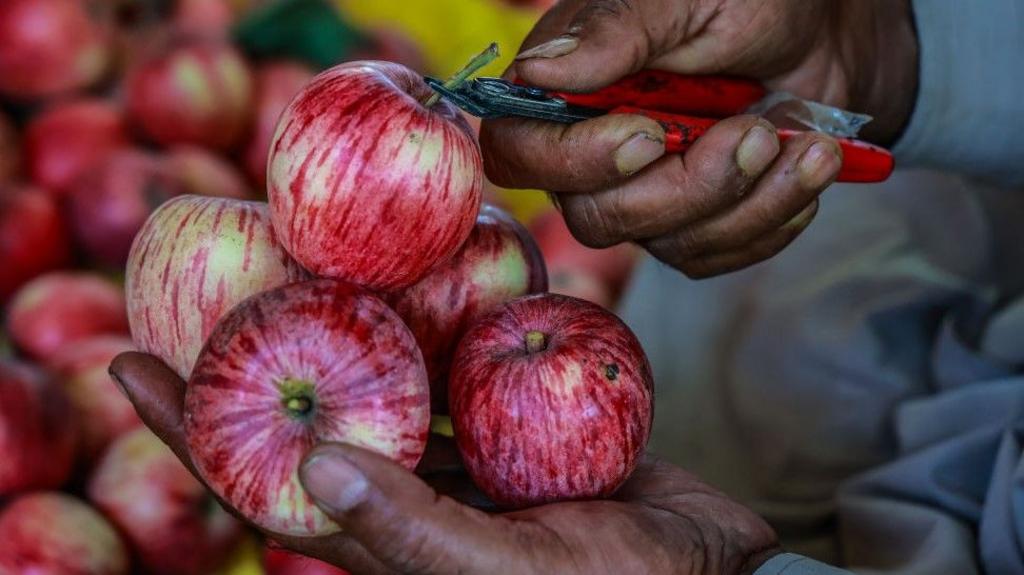“My neighbors thought I was crazy,” says farmer Kakasaheb Sawant.
In 2022, he planted apple trees in subtropical southern India, where temperatures soar to 43°C—an unusual undertaking for a farmer.
Of 100 saplings, 80 survived, yielding 30-40 kilograms of fruit per tree last year.
“My farm has become a local marvel. People travel from afar to witness apple trees thriving under the scorching Maharashtra sun.”
However, the apples lack sweetness for commercial sale.
Mr. Sawant remains optimistic, successfully selling saplings and anticipating improved harvests.
“This is just the beginning. The trees are acclimatizing; within four to five years, they should bear sweet, high-quality apples.”
Mr. Sawant aims to contribute to India’s growing apple demand.
Production has increased 15% in five years to 2.5 million tonnes.
This increase fails to meet demand, with imports doubling to 600,000 tonnes during the same period, according to apple trade analyst S Chandrashekhar.
“We have an apple production shortage,” he explains. “There aren’t many new entrants, and investment is stagnant.”
Optimal apple cultivation requires extended periods of 0-6°C winter temperatures.
Countries like the UK, with roughly 1,000 hours of such chill hours, produce diverse apple varieties.
India has limited areas with these conditions.
Most Indian apples originate from Jammu and Kashmir and Himachal Pradesh in the north.
Mr. Chandrashekhar notes declining productivity in these regions.
“Many old orchards yield fewer apples—reducing overall output,” he says.
He attributes this to increasingly unfavorable climate change conditions.
To expand apple production, scientists and farmers experiment with low-chill varieties.
These trees produce crops with approximately 400 chill hours.
Ranchi, eastern India, with its hot subtropical climate, is not an apple-growing region.
However, Birsa Agricultural University (BAU) researchers test 18 saplings of three low-chill varieties.
Success remains limited—only one variety produced fruit.
“Plants haven’t reached optimal size. The tree yielded only one to two kilograms of edible, though not top-quality, apples in 2024,” says Dr. Majid Ali.
He cites unfavorable climate, unsuitable soil, and termite infestations as challenges.
“This is experimental. Determining success requires three to four more years.”
Local farmers’ similar experiments have yielded little success.
Some doubt the commercial viability of apples from hot regions.
“Fruit from non-traditional areas has short shelf life and lacks sweetness,” says Dr. Dinesh Thakur, associate director of a regional horticulture research center.
“Low-chill apples might suit home gardens, but their commercial viability is unproven; most fail,” he adds.
Dr. Thakur, based in Himachal Pradesh, focuses on apple breeding and improvement.
“Climate change severely impacts apple cultivation,” he states.
Chill hours are decreasing, and erratic weather causes significant annual financial losses for farmers.
Orchards are being relocated to higher, previously too-cold altitudes.
Under a government project, his team tests 300 apple varieties to assess climate change effects.
“We’re developing climate-resilient apple genotypes,” he says.
They’ve developed an apple that ripens two months earlier, offsetting erratic weather and improving color quality where sunlight is limited.
“This is initial research for climate-resilient, palate-pleasing fruit.”
For Mr. Chandrashekhar, increasing India’s apple production requires more than scientific advancements.
“Apple orchards in traditional areas are 15-20 years old. Replanting is crucial,” he explains.
“The industry needs massive investment. Who will provide it?”
He suggests developing the juice and jam industry to diversify income streams.
“This could boost the apple economy and improve growers’ positions.”
The annual event in Malvern will run until Sunday, showcasing British agriculture.
Details are still emerging, but these are the people so far confirmed by the BBC to have died.
The cost of crude oil affects everything from the price of food at the supermarket to how much it costs to fill up your car.
BBC journalists heard the heart-wrenching stories of families desperate for news of their loved ones.
Mr Ramesh said he saw cabin crew members and passengers dying in front of his eyes.

